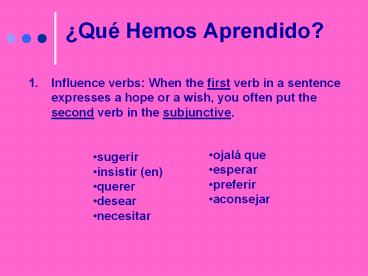- PowerPoint PPT Presentation
Title:
Description:
Qu Hemos Aprendido? Influence verbs: When the first verb in a sentence expresses a hope or a wish, you often put the second verb in the subjunctive. – PowerPoint PPT presentation
Number of Views:39
Avg rating:3.0/5.0
Title:
1
Qué Hemos Aprendido?
- Influence verbs When the first verb in a
sentence expresses a hope or a wish, you often
put the second verb in the subjunctive.
- ojalá que
- esperar
- preferir
- aconsejar
- sugerir
- insistir (en)
- querer
- desear
- necesitar
2
Qué Hemos Aprendido?
- Emotion verbs When the first verb in a sentence
expresses of emotion such as Im happy or Im
sad, you often put the second verb in the
subjunctive.
- Alegrarse de que
- Sentir que
- Tener miedo de que
- Esperar que
- Estar contento/a (de) que
- Estar triste (de) que
- Lamentar
- Temer
- Darse pena
- Molestarse
- Sorprenderse
3
Qué Hemos Aprendido?
- Doubt, denial and uncertainty verbs When the
first verb in a sentence expresses doubt , denial
or uncertainty, you often put the second verb in
the subjunctive.
- No es cierto que
- No es evidente que
- No está claro que
- No es verdad que
- No es obvio que
- Dudar que
- Es dudoso que
- No creer/pensar que
- Negar (ie) que
- No estar seguro/a que
4
Qué Hemos Aprendido?
- Impersonal expressions These impersonal
expressions followed by que are used to form
subjunctive sentences,
- Es extraño
- Es increíble
- Es mejor/bueno/ malo
- Es fantástico
- Es maravilloso
- Es una vergüenza
- Es lamentable
- Es bueno que
- Es importante que
- Es lógico que
- Es malo que
- Es mejor que
- Es necesario que
- Es peligroso que
- Es posible que
- Es urgente
- Es horrible/terrible
- Qué vergüenza
- Qué lástima/pena
- Qué sorpresa
- Qué bueno
- Es probable que
- Es raro que
- Es ridículo que
- Es triste que
- Es una lástima que
5
Hoy vamos a aprender
- Adjective clauses The subjunctive can also be
used to describe a person, animal or thing that
you are looking for or want and that may or may
not exist.
Por ejemplo Busco un estudiante que le guste
español. Use the subjunctive after nada,
nadie, ninguno(a) if it refers to a non-existent
person, place or thing. Por ejemplo No
encuentro a ningún estudiante que quiera hablar
español.
6
Práctica
- Buscamos una oficina que _____________ (tener)
una vista del mar. - Necesita un gerente que ____________ (hablar)
español. - Conozco a una chica que ___________ (hablar) tres
idiomas. - No hay ninguna persona que _____________ (poder)
ayudar.
tenga
hable
habla
pueda
7
Tambien vamos a aprender
Present erfect subjunctive (el pretérito
perfecto de subjuntivo)
- The present perfect subjunctive (el pretérito
perfecto de subjuntivo), like the present perfect
indicative, is used to talk about what has
happened. - The present perfect subjunctive is formed using
the present subjunctive of the auxiliary verb
haber and a past participle.
8
Present erfect subjunctive (el pretérito
perfecto de subjuntivo)
CÓMO SE FORMA?
- Present perfect indicative
- PRESENT INDICATIVE PAST PARTICIPLE
- OF HABER
- Present perfect subjunctive
- PRESENT SUBJUNCTIVE PAST PARTICIPLE
- OF HABER
yo he hablado
yo haya hablado
9
Present erfect subjunctive (el pretérito
perfecto de subjuntivo)
Por ejemplo
cerrar perder
yo haya cerrado haya perdido
tú hayas cerrado hayas perdido
Ud. / él / ella haya cerrado haya perdido
nosotros/as hayamos cerrado hayamos perdido
vosotros/as hayáis cerrado hayáis perdido
Uds. / ellos / ellas hayan cerrado hayan perdido
10
Present erfect subjunctive (el pretérito
perfecto de subjuntivo)
Otro ejemplo
asistir
yo haya asistido
tú hayas asistido
Ud. / él / ella haya asistido
nosotros/as hayamos asistido
vosotros/as hayáis asistido
Uds. / ellos / ellas hayan asistido
11
Irregular Past Participles
- abrir abierto
- decir dicho
- escribir escrito
- hacer hecho
- morir muerto
- poner puesto
- romper roto
- ver visto
- volver vuelto
- resolver resuelto
12
Present erfect subjunctive (el pretérito
perfecto de subjuntivo)
CÓMO SE USA?
- The same conditions which trigger the use of the
present subjunctive apply to the present perfect
subjunctive. - Present subjunctive Present perfect
subjunctive - Espero que duermas bien. Espero que hayas
dormido bien. - I hope that you sleep well. I hope that
you have slept well. - No creo que aumente de peso. No creo que haya
aumentado de peso. - I dont think he will gain weight. I
dont think he has gained weight.
13
Present erfect subjunctive (el pretérito
perfecto de subjuntivo)
- The action expressed by the present perfect
subjunctive is seen as occurring before the
action expressed in the main clause. - Me alegro de que ustedes se hayan reído tanto
esta tarde. - Im glad that you have laughed so much this
afternoon. - Dudo que ella se haya divertido mucho con su
suegra. - I doubt that she has enjoyed herself much with
her mother-in-law.
14
Present erfect subjunctive (el pretérito
perfecto de subjuntivo)
- ATENCIÓN!
- In Spanish the present perfect subjunctive is
used for a recent action. - No creo que lo hayas dicho bien.
- I dont think you said it right.
- Espero que él haya llegado.
- I hope he arrived.
15
- INTÉNTALO! Indica el pretérito perfecto de
subjuntivo de los verbos entre paréntesis. - 1. Me gusta que ustedes ____________ (decir) la
verdad. - 2. No creo que tú ____________ (comer) tanto.
- 3. Es imposible que usted ______________ (poder)
hacer tal (such a) cosa. - 4. Me alegro de que tú y yo _______________ (ver)
la película. - 5. Es posible que él ____________________
(Divertirse) un poco la semana pasada. - 6. Espero que _________ (haber) suficiente comida
en la celebración.
hayan dicho
hayas comido
haya podido
hayamos visto
se haya divertido
haya

